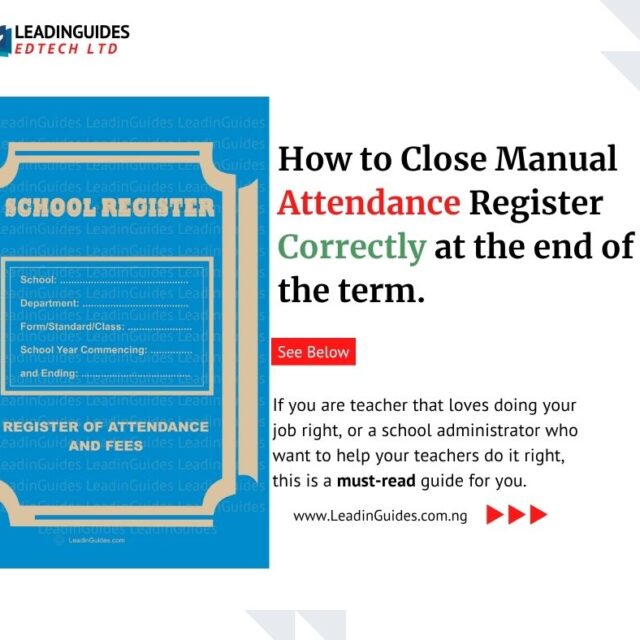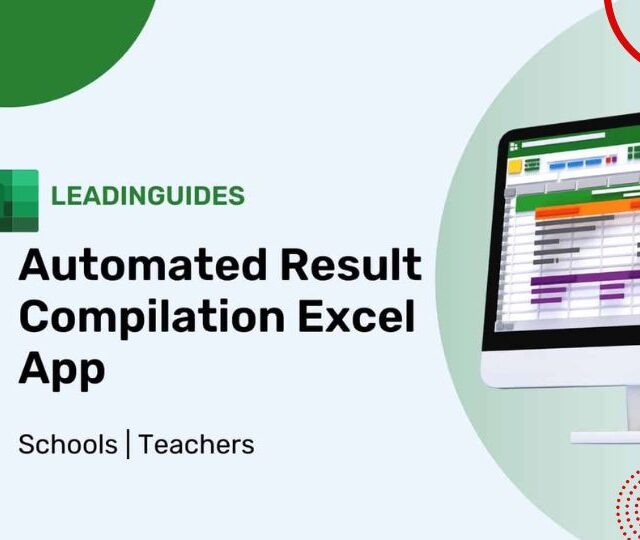
Introduction to How to Conduct Standard School Exams in Nigeria
Introduction to How to Conduct Standard School Exams in Nigeria
I have toured and worked with a good number of schools in Nigeria in the last couple of years. Most of my visits have been during the examination time. This is because of the examination-related services we provide for schools – including typesetting and answer booklet production.
What I have observed in many schools as regards the conduct of examinations is a disaster. Among the oddities, you will see in many schools during an examination period in Nigerian include the fire brigade’s approach to the setting of questions, insufficient question papers and answer sheets, inconsistent grading, etc.
All of these make an unsupporting condition for many students to pass. It makes you wonder who to blame for a student’s poor performance, whether the student or the school who conducted the poor examination. It does not matter, it is one of the typical Nigerian things, the fault of failure is always the child. This, however, does not support growth.
If we must make any progress, we have to be able to accurately identify the source of failure and address it accordingly. This is not to say that students do not underperform due to their faults. Instead, the implication here is that we can reduce the number of failures by making effort to conduct better examinations.
Unfortunately, the oddities in many Nigerian schools during examinations seem to occur in cycles. Year in, year out, in every examination, the same thing happens with a few exceptions on lucky times.
Every discussion I have had with school owners and administrators has ended on how to conduct school exams in Nigeria.
If you are a school administrator and you are wondering how to conduct standard exams in Nigeria, here are seven things every teacher and standard school in Nigeria does to conduct standard school exams:
- Determine the purpose and format of the exam
- Create a detailed exam plan
- Prepare the exam materials on time
- Set up the exam hall
- Conduct the exam
- Mark and Grade the Exam
- Communicate the exam results
Determining the Purpose and Format of an Examination
The first step to conducting a standard exam is to determine the purpose and format of the exam. Many schools and teachers do not think of the purpose of an examination before conducting it. Some conduct exams because it is a part of the school system by default. So, once it is time, they do it without first asking the most important exam questions.
The result of this is that you see an examination whose purpose is not in touch with its goal. In such examinations, teachers set the wrong questions for the wrong purpose. Schools organize the examination in a way that is convenient for them instead of the way that is best suited for the goal.
Once, the type of question I saw a school set for preschool gave me a headache. At another time, I witnessed a senior school writing its entire mock examination on a chalkboard! The standard of the question is totally out of touch with the external exams the school was preparing the senior students for. In such a situation, can one blame those senior students if they did not measure up in the external examination? To be fair, not totally.
That is why we have to ask, what is the goal of conducting examinations in our schools?
To answer the question,
you must understand that the goal varies from level to level and from time to time. Among the general purpose of conducting examinations which you already know are:
- Identify the Learners’ Performance
- Access Effectiveness of Instructor or instructional approach
- Prepare Students for External Examination
Before conducting an exam, you should determine its purpose and format. Will it be a formative or summative assessment? What kind of questions will be included? How many questions will be on the exam? Will there be any essay questions? Answering these questions will help you to determine the structure and content of the exam.
Generally, the type of question and format of the examination should match its purpose. For instance, if you are conducting a mock examination to prepare students for higher examinations, the questions should be similar to those you expect them to see in the external exams.
There are some situations that after analysing a student, you may not need to give them any examination. For instance, you do not need to give an examination to preschoolers in most cases.
Create a detailed Examination plan
Once you have determined the purpose and format of the exam, you should create a detailed exam plan. This plan should include the date and time of the exam, the venue/halls of the exam, the duration of the exam, and any materials that students will need to bring with them. You should also consider factors such as accommodations for external students (if applicable) and students with disabilities or language barriers.
This point is really important because it is the lack of proper planning for an examination that leads to the fire brigade’s approach.
Ordinarily, you should have a committee that creates an examination plan as part of the academic programme. In some schools, it is among the tasks performed by the academic planning committee. Other schools create a sub-committee, examination and timetable committee.
I have been to a couple of schools that do not release an academic timetable for a session or even a term. Some schools release examination timetables only a few days before the examination, as few as a day. The worst are the schools that do not give any examination timetable at all!
An examination timetable is not for “big schools”. You cannot operate your school casually and expect sustainable growth. No matter the size of your school, normalize doing things as professionally as possible.
Whether you have a committee or you are a one-man administrator, always create a detailed plan for every examination. Do this, early enough to allow time for proper implementation. The best time is the first week of resumption or prior.
On no condition should you proceed on midterm break without you having created a detailed plan for the end of the term examination.
Prepare the exam materials
The next step is to prepare the exam materials. This includes creating exam questions, answer sheets, and any other materials that students and staff will need during the exam. It’s important to proofread and edit the exam questions to ensure that they are clear and concise.
The need to get your examination materials ready on time cannot be overemphasized. The main reason your examination will not proceed as you have planned is the unavailability of the examination materials.
The common practice in schools that conduct standard examinations at the end of the term is that teachers submit all exam-related materials before, during the holiday or immediately after resuming from the previous term’s vacation.
If this is not the case with you, ensure you have all your examination questions ready at least 2 to 3 weeks before the examination. If you do not have an in-house typist, give the questions out on time so as to have them early.
An essential point
If you must attain sustainable growth, you must be intentional about how you market your school brand. Many upcoming schools demarket themselves by conducting abysmal examinations. From the standard of the questions to their wording, from the answer sheet they use to marking and grading; it tells everything about your school.
You must understand that results are the singular most important school material that the majority of parents/people pay attention to. This is why schools that succeed take their time to prepare their exam questions, produce quality answer sheets and ensure professional handling. It is a matter of rarity to see typographical errors on materials emanating from such schools.
Get your questions on time. Proofread the questions before and after typesetting to ensure it is free of error. A standard examination question paper should indicate the marks allocated to each question. Use customized answer sheets that advertise and sell your school.
Set up the exam hall
On the day of the exam, you should set up the exam room. This includes arranging desks or tables, ensuring that there is adequate lighting and ventilation, and making sure that students have enough space to work comfortably.
Worthy of special mention is a sitting arrangement that curtails examination malpractices. Discuss and plan all of these with your staff prior to the day of the examination.
Conduct the exam
Once the exam room is set up, it’s time to conduct the exam. You should ensure that students understand the instructions and the format of the exam.
I have witnessed examinations where students are tensed and unable to make a sound. This is not a standard practice. The order of human needs is such that students cannot bring out the best in them when they are in fear. Ensure students are comfortable. Discuss examination procedures with the students. Apart from clear and unambiguous questions, make arrangements for supervisors or invigilators that can answer students’ questions during the examination.
During the exam, you should monitor the students to ensure that they are not cheating or engaging in any other misconduct.
A disservice schools do themselves is giving answers to students in order for them to perform well so as to please the parents. This is an ineffective strategy in the long run. Students in such schools tell their parents. Parents, in turn, grade your school based on this report. When such parents want to be serious with their child’s education, be rest assured they won’t leave them in your school.
By giving answers to your students, you are telling the parents that you are willing to compromise. You see this often when it is time to pay fees. They expect compromise.
Mark and Grade the Exam
Once the exam is over, you should ensure professional and consistent marking and grading. There is a way you see a teacher mark a script that you will just shrug. Such a type of marking and grading examination scripts will only demarket your school.
As a school administrator, I ensured that I take all new recruits through our standard marking procedure. No such thing as an oversight. When it comes to marketing an examination script, a teacher’s red pen bears witness to either the correctness or wrongness of what a student has written.
For elementary learners, it is recommended that teachers do not just mark good or bad. Instead or in addition, correct the wrong answers.
I have seen teachers award grades arbitrarily according to their whims. It cannot be any wrong than that. For every question, clearly indicate the overall mark allocated and the mark awarded. This helps to maintain consistency.
Finally, provide appropriate feedback to students on their performance. If you have seen enough examination scripts from different schools, you will have seen a lot of unseemly comments on students’ booklet. Answer booklet is not the place you explain to a student or parent the reason for their failure. Instead, it is the place you tell them what the student has attained and what he or she needs to improve on.
Communicate with parents and students
It’s important to communicate with parents and students about grades. Prepare your reports neatly and professionally without errors. I strongly recommend that you automate the process. If you cannot afford full-fledged software, use simple Microsoft Excel templates like the Automated Result Compilation Template.
One benefit of automating your report is that it makes reporting timely and more useful for all parties.
Be clear about the grading criteria and how you arrived at the grades assigned. You should also be available to answer any questions or concerns that parents and students may have about grades.
Conclusion of How to Conduct Standard School Exams
In conclusion, conducting standard examinations requires careful planning and preparation. By determining the purpose and format of the exam, creating a detailed exam plan, preparing the exam materials, setting up the exam room, conducting the exam, marking and grading the exams, and communicating the exam results, you can ensure that the exam is conducted efficiently and effectively. By following these tips, you can help your students to achieve their academic goals and succeed in their studies.
Work Consulted
Hosbeg. (n.d.). The Importance of Examination. Retrieved from Hosbeg: https://hosbeg.com/the-importance-of-examination/
Discussions
Log in below to have your reviews and comments appear instantly.
Related Guides You May Also Like
Closing Attendance Register Termly
This post, Closing Attendance Register Termly, in one sentence This post, Closing Attendance register termly; provides step-by-step guides on how to correctly close students’ attendance registers for every term. This guide is for schools and teachers that use the traditional (manual) attendance register. However, schools and teachers that use modern attendance system can also benefit […]
School Owner-Administrator Too Lenient? What to do
A school owner-administrator too lenient? Yes, some are; and “uncontrollably” so. The problem is that been too lenient has repercussions, negative ones – for the administrator, staff and the organization. So, when a school owner-administrator is too lenient; what is the right thing to do? In this post, I discuss just that. In addition, I […]
Automated Result Compilation Excel App
What is the Automated Result Compilation Excel App? This Automated Result Compilation Excel App is a Microsoft excel application that helps schools and teachers to quickly compile and prepare many students’ report cards at once. LeadinGuides created the automated result compilation excel app as alternative for low-cost schools who cannot afford the more complex online […]




